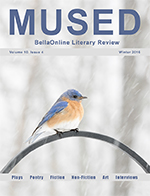Visitation
Susan P. Blevins
David, and his wife, Margaret, were close friends of mine when my husband and I lived in Rome. We were all ex-pat Brits, attended the same church, and David and my husband both worked at the Food and Agriculture Organization of the United Nations, headquartered in Rome. David had also very recently been ordained as an Episcopal priest.
He and Margaret had an English-speaking general physician, but when he became seriously ill, and was told he needed to see a specialist to go over his lab results, they asked me to go with them as interpreter, since their Italian language skills were not as developed as mine.
We all sat in front of the specialist, who was seated behind his desk, and I was the first one to learn that David had advanced liver cancer. It was agonizingly hard for me to tell him the news, and to inform him that he probably had only about three months to live. That was definitely one of the more difficult tasks I have ever undertaken.
His illness progressed rapidly, and he ended up in the private hospital run by nuns which is much favored by the foreigners living in Rome. I was visiting him one day, together with Margaret, when he told us he had had a vision.
He told us that the previous night he had been lying sleepless in bed, when from the window to his left, an angel entered the room, came over to him, tied up his feet with a cord, and exited through the closed door (literally) to his right. He was thrilled to have had the vision but had no idea what it meant. David was a scientist, an oceanographer by training, so when he told us this, we knew it had to be a hard fact. Margaret and I were both in Jungian psychoanalysis at the time, so when he told us of his vision, we looked at each other in alarm, for we both knew immediately what it meant: that he was never going to walk out of the hospital, and would die shortly.
A few days later, he died, sadly without Margaret or me present, something for which Margaret cannot forgive herself even today, though he died several years ago. The hospital informed both of us the moment he died, which was late in the evening, so the hospital chaplain was not there. Margaret could not bear to go in to see him alone. She waited for me at the hospital so we could go in together. I read the Ministration at the Time of Death over him from the Book of Common Prayer, and some of the appropriate psalms, to bring hope and consolation to Margaret with the familiar and comforting liturgy. They had been married for many years, had no children, and were extremely close. This was devastating for Margaret, and for me too, since I had been privy to the whole progression of the disease, and an intimate friend and participant in everything involved in his decline. I spent several nights sleeping at Margaretís house after his death, and helped her go through his things, which was a challenge, for he was a man of many interests.
He was laid out in the private hospitalís chapel wearing his priestly vestments, including the purple stole with gold fringe that I had made for him just recently as an ordination gift. Later he was cremated, and a funeral service was held for him in our own church. It was an honor and a privilege to have assisted them, and to have functioned at the end as priest.

